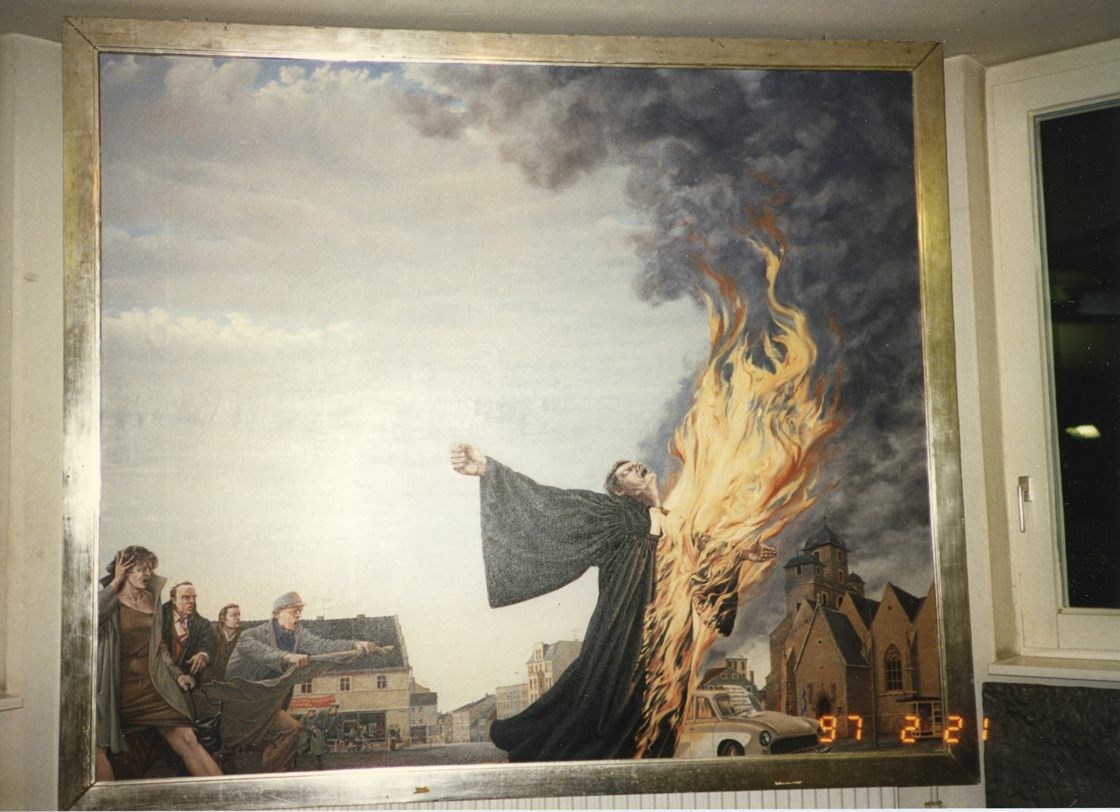
Oskar Brüsewitz Lutheran pastor burns himself alive 1976

Oskar Brüsewitz (May 30, 1929 - August 22, 1976) was an East German Lutheran pastor who committed public self-immolation to protest the repression of religion in the Communist state of East Germany.
Michaelis Church in Zeitz, Germany.
With the Second World War nearing its end, Brüsewitz joined the Wehrmacht in 1944 as a fifteen-year-old, was captured by the Red Army and became a prisoner of war. He worked as a shoemaker after the war and converted to Christianity in 1954 under the influence of his family then attended a Lutheran seminary from 1964 until 1969 in Erfurt. In 1970 he was ordained in the Evangelical Lutheran Church at Rippicha in the district of Zeitz. He was critical of the East German Communist regime imposed by the Soviet Union after the war and symbolic acts of protest, including the installation of a cross of neon lamps at his church, brought him to the attention of the authorities. The leadership of his church sided with the state, rather than its priest, and asked, in 1976, for Brüsewitz to be moved to another rectorate. This was the immediate trigger for his suicidal protest in a public market in front of the church in Zeitz. The fire was quickly doused by officials from the Ministry for State security, but Brüsewitz died four days later from his burns.
On the day of his protest he carried pamphlets accusing the communists of repression which read; "Funkspruch an alle: Die Kirche in der DDR (Deutsche Demokratische Republik) klagt den Kommunismus an! Wegen Unterdrückung in Schulen an Kindern und Jugendlichen" ("A Radio message to everyone: The church in the GDR accuses communism! Because of the suppression of children at school"). In his suicide note he wrote of a "feigned deep peace, which had also intruded Christianity" in East Germany while in truth there was "a mighty war between light and darkness"("zwischen Licht und Finsternis ein mächtiger Krieg").
Brüsewitz died of his severe burns on August 22, 1976 in a hospital in Halle Dölau. His self-sacrifice brought support from both his parishioners and figures in the church and led to a reappraisal within the church hierarchy of its relationship with the Communist dictatorship. The Protestant Church now sees Brüsewitz's protest as an early step towards the mass popular protests which led to the collapse of East Germany in 1989.
The Communist authorities initially attempted to suppress news of the event then, when news leaked and public support for his action grew, they branded him a psychopath. On August 31 Neues Deutschland, the official newspaper of the ruling Socialist Unity Party (SED), printed an article entitled "Du sollst nicht falsch Zeugnis reden" "You shall not bear false witness" which asserted that self-immolation was the action of a sick, crazy man. A similar article appeared in Neue Zeit, the newspaper of the East German Christian Democratic Union.
The Protestant church of the ecclesiastical province of Saxony commemorated his sacrifice twenty years later in 1996, six years after the reunification of Germany. Bishop Dehmke called his death an "act of desperation" in protest against the repressive nature of the communist regime and the collaboration of church members who had grown too close to the state.